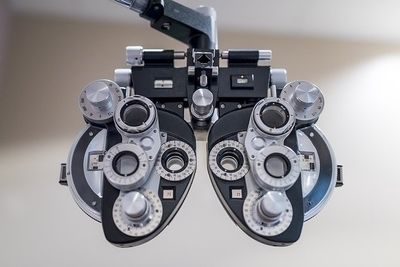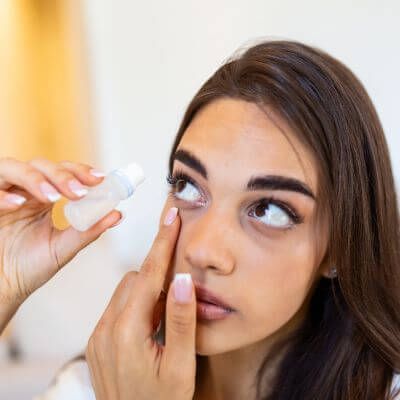7 Signs That It’s Time For Your Next Comprehensive Eye Exam
It’s easy to let things slip when life gets busy. You make sure to get your annual physical and see your dentist regularly, but what about your vision? You may think it’s no big deal, but it’s just as important to get your annual comprehensive eye exam. If you’re not sure if it’s time to schedule your next exam, here are a few clues:

- You can’t remember your last comprehensive eye exam
- You have a higher risk of vision problems
- It’s allergy season
- Your vision isn’t what it used to be
- You get headaches concentrated around your eyes
- Night driving has become more difficult
- You’re experiencing other vision problems
Signs that you need a comprehensive eye exam can vary. By getting them regularly, your ophthalmologist will be able to catch problems early on and provide you with the treatment you need.
1. You Can’t Remember Your Last Comprehensive Eye Exam
Do you remember the last time you had a comprehensive eye exam? Have you ever had an actual comprehensive exam eye exam? If you answered “no” to the first question and were confused by the second, then it’s definitely time to get one.
These aren’t the same eye exams you received in school, nor are they the kind you get to only update your eyewear prescription. Comprehensive exams, also known as baseline comprehensive eye exams , do much more than that. They use dilation to identify problems that often go unnoticed.
You should begin getting regular comprehensive eye exams every two to four years starting at the age of 40. They should become more frequent once you turn 55 with yearly exams or at least once every three years. Those with diabetes or are pre-diabetic should get yearly exams.
2. You Have a Higher Risk of Vision Problems
There are a variety of reasons you may have a higher risk of developing vision problems than others. One of the most common reasons is your family history . Genetics can play a huge role in your vision as well as overall health. This includes complications due to diabetes, glaucoma, AMD , and Fuch’s dystrophy.
Having a family history of eye disease doesn’t guarantee you’ll get it. However, it’s important to disclose that information to your doctor so they know what to check for to be on the safe side. For instance, it can take years for the effects of cataracts to become apparent. By knowing your family history, your doctor can provide the treatment you need before it takes full effect.
Sometimes vision problems can be the result of something completely unexpected . Glaucoma is often genetic, but it can also be the result of other factors. This can include:
- Eye injuries
- Steroids
- Eye melanomas
Talk to your eye doctor if any of these apply to you. This will help them know to keep tabs on any signs of glaucoma or other eye problems before they progress too far.
3. It’s Allergy Season
Allergies can have a huge impact on your vision and can manifest themselves in different ways. For instance, common symptoms such as a stuffy nose, sneezing, and sniffling may not be present. However, you may have eyes that are red, itchy, and tearing up.
In cases like these, your eye doctor can perform an exam to make sure it’s allergies and not something stuck in your eye. They may recommend simple over-the-counter eye drops or prescribe medication. They may recommend that you see an allergy specialist in severe cases.
4. Your Vision Isn’t What It Used to Be
It’s an unfortunate fact that your visions will diminish as you get older. These problems start small. You may find yourself squinting more to read street signs or text on a computer screen. On the other hand, you may find yourself having to hold your phone or a book further away to make out what it says.
These problems can interrupt your routine. More concerning is that they can create real dangers if not addressed immediately. Regular comprehensive eye exams guarantee that these changes are being documented and addressed by your eye doctor. Not only will it help you be less frustrated, but it will help you feel safer, as well.
5. You Get Headaches Concentrated Around Your Eyes
Everyone has headaches from time to time, but sometimes they may be a symptom of a bigger problem. In some cases, headaches may signal problems with your eyesight. These types of headaches are usually concentrated at the front of your head and around your eyes.
Frontal headaches may mean that you:
- Have a prescription that’s too strong
- Need of reading glasses
- Need progressive lenses
Sometimes headaches can point to a more serious vision problem. This could be due to a retinal tear or a lack of blood to the retina or optic nerve.
Our eye doctors will be able to diagnose the problem as well as prescribe treatment. With comprehensive eye exams, they’ll be able to make note of the problem and reduce its effects much earlier than without them.
6. Night Driving Has Become More Difficult
Driving at night is already hazardous and difficulty seeing only makes it worse. This could be an issue of becoming farsighted as you get older, which can make seeing street signs even more difficult at night. You may also experience glare from oncoming traffic which can make it difficult to drive safely.
In these cases, comprehensive eye exams can help diagnose the problem and help fix it. This could be fixed with a stronger prescription and anti-glare coating for glasses. Those 50 years and older may be experiencing cataracts. Your eye doctor can develop a treatment plan to stave off their effects until surgery becomes necessary.
7. You’re Experiencing Other Vision Problems
You may experience other vision problems that need diagnosing and treatment. Some common issues include:
- Wavy vision
- Seeing halos
- Double-vision
Wavy vision may occur when straight lines seem distorted or once-vibrant colors appear to be faded. This could signal AMD, which is when you begin to lose your central vision. Seeing halos and double-vision around lights may indicate cataracts. It can take years for symptoms to become apparent so comprehensive eye exams are essential for diagnosis and treatment.
There are many signs that it’s time for your next comprehensive eye exam. Your first signal is if you can’t remember the last time you had one. Being at high risk for vision problems is also an important indicator. Even the time of year can be a signal as allergy season sets in. Your eye doctor can also use comprehensive exams to diagnose and treat problems like headaches, difficulty driving at night, and a host of other vision issues that may be bothering you.
Did this list confirm that it’s time for a comprehensive eye exam? If so, contact us today and we’ll get you scheduled!
Baptist Eye Surgeons is an ophthalmological practice in Knoxville, TN, and Morristown, TN. Give us a call at 865-579-3920 for more information or to schedule an appointmen t.


MORRISTOWN
SEVIERVILLE
TENNESSEE VALLEY - LASER CENTER
TENNESSEE VALLEY - EYE CENTER



